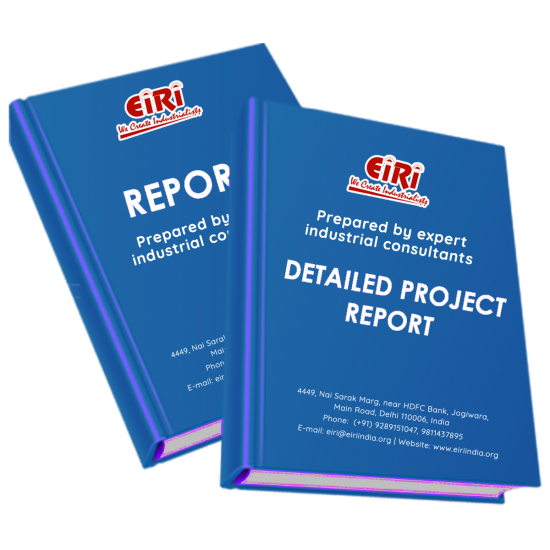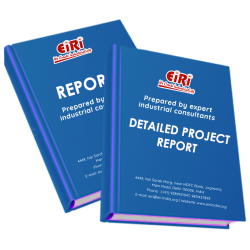Detailed Project Report on Liquid Glucose from Broken Rice Cap: 40 Ton/Day

- More than 40 years of experience
- Managed by expert industrial consultants
- ISO 9001-2015 Certified
- Registered under MSME, UAM No: DL01E0012000
- 24/5 Research Support
Get your quesries resolved from an industry expert. Ask your queries before report or book purchase. - Custom Research Service
Speak to the our consultant to design an exclusive study to serve your research needs. - Quality Assurance
All reports are prepared by highly qualified consultants & verified by a panel of experts. - Information Security
Your personal & confidential information is safe & secure.
LIQUID GLUCOSE FROM BROKEN RICE
[EIRI/EDPR/1536] J.C.: 254INR, 742US$
INTRODUCTION
Starches
Starch is a group of polysacchrides, composed of glucopyranose units joined together by-glucosidric linkages. It conforms to the molecular formula, (C6-H10O5)u, where n varies from a few hundred to over one million. Starch is found as the reserve carbonhydrate in various parts of plants and is enzymatically broken down to gluose to other erbohydrates according to the metabollic needs of the plants.
Industrially, starch is broadly divided into two types viz, natural and modified. Natural starches also designated as unmodified starches or simply starches are obtained from grains such as and sorghum. From roots like potato, tapioca and arrow root and from the pith of the stems of certain palms such sago. They are further classified into cereal starches and root starches. The characteristics of the natural starches are changed by chemical or enzymatic action and the products of these reactions are termed modified starches. This group includes dextrins, acid-modified starches, oxidized starches, starch esters, starch ethers, dialdehyde starches and cationic starches.
Natural Starches
Starch occurs naturally in the plants and its percentage varies with the plant and also in different parts of the same plant. Corn (maize) sorghum grain wheat, rice, potato, tapioca, arrowroot and sago are among the important sources of natural starches. The grains of barley, rye, oat and the millets are also employed in the production of starches.
Maltodextrins are products with a low Dextrose Equivalent (DE) from 3 to 20, obtained by enzyme Conversion (usually Alpha-amylase). They are usually spray dried powders (less than 5 percent moisture) as the corresponding liquids have extremely high viscosities and tend to become cloudy on storage. Among Maltodextrins, the very low DE product is prepared from waxy corn starch, a natural starch that is almost entirely the amylopectin Polymer.
Maltrodextrin is a purified concentrated aqueos solution of nutritive saccharides obtained from edible starch, or the dried product derived from said solution and having a dextrose equivalent (DE) less than 20.
Maltodextrin (C6H10O5)n H2O is a mixture of saccherides with a molecuelar weight between poly saccharides and oligosaccharides with DE lower than 20 (not sweet) which is available as white powder mostly or concentrated solution. It physical and functional properties such as sweetners. Compressibility and viscosity vary depending upon the extent of starch hydrolyses which is characterized by DE determination.
It is used in food industry, bulking agent fat replacer, medical/nutritional purpose.
The U.S. Food and Drug Administration has defined maltodextrins as a "nonsweet nutritive saccharide polymer that consists of D-glucose units linked primarily by (alpha)-1,4 bonds and that has a dextrose equivalent (DE) of less than 20. It is prepared as a white powder or concentrated solution by partial hydrolysis of corn starch or potato starch with safe and suitable acids and enzymes.
The food industry usually refers to corn-based products when referring to maltodextrins. But in addition to the legally defined corn and potato versions, some ingredient manufacturers also produce "maltodextrins" from other starchy sources, such as rice and tapioca. The current labeling status of these products is unresolved, so they might require the term "hydrolyzed (starch/source).
COST ESTIMATION
Plant Capacity 40 MT/Day
Land & Building (16,000 Sq.Mtr) Rs. 13.37 Cr
Plant & Machinery Rs. 4.59 Cr
W.C. for 2 Months Rs. 4.93 Cr
Total Capital Investment Rs. 24.42Cr
Rate of Return 35%
Break Even Point 46%
CONTENTS
INTRODUCTION
PRODUCT DESCRIPTION AND USE
USES AND APPLICATION OF MALTODEXTRIN
PROPERTIES
PROPERTIES AND CHARACTERISTICS OF MALTODEXTRIN
B.I.S. SPECIFICATION
MARKET SURVEY
FUTURE EXPANSION PLANNING OF KBRL LTD INTO LIQUID GLUCOSE
PRESENT MANUFACTURERS
SPECIFICATIONS
MANUFACTURES OF STARCH AND ALLIED PRODUCTS
MANUFACTURING PROCESS
PROCESS FLOWSHEET FOR STARCH MANUFACTURING FROM BROKEN RICE
MANUFACTURING PROCESS FOR LIQUID GLUCOSE
MANUFACTURING DIAGRAM MANUFACTURS OF LIQUID GLUCOSE
MANUFACUTRING PROCESS OF MALTODEXTRIN FROM BROKEN RICE
PROCESS FLOW DIAGRAM OF MALTODEXTRIN FROM RICE STARCH
OBTAINED FROM BROKEN RICE
SEPARATION OF PROTEINS AND PRODUCTION OF MALTODEXTRIN
ASSAY METHOD OF MALTO DEXTRIN (REDUCING SUGAR)
WET MILLING PROCESS
RAW MATERIALS & YIELD
CONSULTANTS FOR GLUCOSE PLANT
SUPPLIERS OF RAW MATERIALS
COMPLETE PLANT SUPPLIERS FOR LIQUID GLUCOSE
SUPPLIERS OF BROKEN RICE
SUPPLIERS OF PLANT & MACHINERY
LIST OF THE BUYERS OF LIQUID GLUCOSE
APPENDIX – A:
01. PLANT ECONOMICS
02. LAND & BUILDING
03. PLANT AND MACHINERY
04. OTHER FIXED ASSESTS
05. FIXED CAPITAL
06. RAW MATERIAL
07. SALARY AND WAGES
08. UTILITIES AND OVERHEADS
09. TOTAL WORKING CAPITAL
10. TOTAL CAPITAL INVESTMENT
11. COST OF PRODUCTION
12. TURN OVER/ANNUM
13. BREAK EVEN POINT
14. RESOURCES FOR FINANCE
15. INSTALMENT PAYABLE IN 5 YEARS
16. DEPRECIATION CHART FOR 5 YEARS
17. PROFIT ANALYSIS FOR 5 YEARS
18. PROJECTED BALANCE SHEET FOR (5 YEARS)
How to Make Project Report?
Detailed Project Report (DPR) includes Present Market Position and Expected Future Demand, Technology, Manufacturing Process, Investment Opportunity, Plant Economics and Project Financials. comprehensive analysis from industry covering detailed reporting and evaluates the position of the industry by providing insights to the SWOT analysis of the industry.
Each report include Plant Capacity, requirement of Land & Building, Plant & Machinery, Flow Sheet Diagram, Raw Materials detail with suppliers list, Total Capital Investment along with detailed calculation on Rate of Return, Break-Even Analysis and Profitability Analysis. The report also provides a birds eye view of the global industry with details on projected market size and then progresses to evaluate the industry in detail.
We can prepare detailed project report on any industry as per your requirement.
We can also modify the project capacity and project cost as per your requirement. If you are planning to start a business, contact us today.
Detailed Project Report (DPR) gives you access to decisive data such as:
- Market growth drivers
- Factors limiting market growth
- Current market trends
- Market structure
- Key highlights
Overview of key market forces propelling and restraining market growth:
- Up-to-date analyses of market trends and technological improvements
- Pin-point analyses of market competition dynamics to offer you a competitive edge major competitors
- An array of graphics, BEP analysis of major industry segments
- Detailed analyses of industry trends
- A well-defined technological growth with an impact-analysis
- A clear understanding of the competitive landscape and key product segments
Need Customized Project Report?
- Ask for FREE project related details with our consultant/industry expert.
- Share your specific research requirements for customized project report.
- Request for due diligence and consumer centric studies.
- Still haven't found what you're looking for? Speak to our Custom Research Team
About Engineers India Research Institute:
Note: We can also prepare project report on any subject based on your requirement and country. If you need, we can modify the project capacity and project cost based on your requirement.
Our Clients

Our Approach
- Our research reports comprehensively cover Indian markets (can be modified as per your country), present investigation, standpoint and gauge for a time of five years*.
- The market conjectures are produced on the premise of optional research and are cross-accepted through associations with the business players
- We use dependable wellsprings of data and databases. What's more, data from such sources is handled by us and incorporated into the report
Why buy EIRI reports?
- Our project reports include detailed analysis that help to get industry Present Market Position and Expected Future Demand.
- Offer real analysis driving variables for the business and most recent business sector patterns in the business
- This report comprehends the present status of the business by clarifying a complete SWOT examination and investigation of the interest supply circumstance
- Report gives investigation and top to bottom money related correlation of real players/competitors
- The report gives gauges of key parameters which foresees the business execution





















![bagasse tableware [plates, glass, bowl, food container etc.] bagasse tableware [plates, glass, bowl, food container etc.]](https://www.eiriindia.org/image/cache/catalog/report/detailed-project-report-cma-data-250x250.png)
